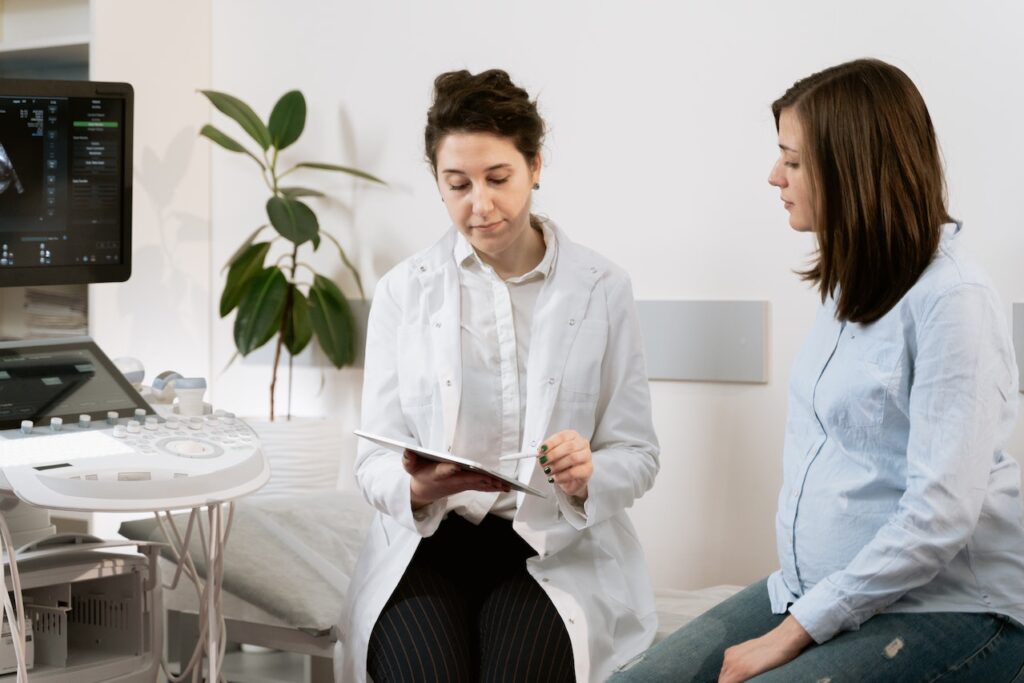It’s your first time getting pregnant and you’re wondering “What the heck do I do now?” Many of us know that pregnancy is a time when your body changes drastically, but how do we prepare for what’s to come?
What do we need to prepare? What habits will I need to change?
In this article, we will go over everything you’ll need to do to get ready for pregnancy including essential and non-essential purchases to make the next 9 months a breeze. You’ll need to think about your diet, your habits, and what to prepare before your brand-new human arrives.
How to get ready for a healthy pregnancy
One of the most important things you can do to ensure a healthy pregnancy is to prepare your body beforehand. The CDC recommends a few things to plan for pregnancy. These are the essentials for ensuring you have the healthiest pregnancy possible.
See your doctor

If you’re planning to get pregnant, it’s important to see your doctor for a preconception checkup. During this appointment, your doctor will review your medical history and perform a physical exam to identify any potential health issues that could affect your pregnancy. They may also recommend certain lifestyle changes or additional tests or screenings, such as genetic testing or blood work, to ensure a healthy pregnancy.
If you have any chronic health conditions, such as diabetes or high blood pressure, your doctor can help you manage these conditions before becoming pregnant to reduce the risk of complications.
Additionally, your doctor can guide you on prenatal vitamins, vaccinations, and other important steps you can take to prepare for a healthy pregnancy. By seeing your doctor before getting pregnant, you can take proactive steps to optimize your health and increase your chances of a successful pregnancy.
Get 400 mcg of Folic Acid daily
The CDC recommends getting 400 micrograms of Folic Acid daily as soon as you find out you’re pregnant. If you’re planning on becoming pregnant you can start taking folic acid one month prior since you won’t be sure of the exact time you’ll conceive.
Folic acid is a type of B vitamin that is important for fetal development, especially during the first few weeks of pregnancy. Taking folic acid while getting ready for and during pregnancy can prevent birth defects in your baby’s brain and spine.
While your prenatal vitamins should have enough folic acid to prepare for a healthy baby, folic acid is found in certain foods as well. Try to add leafy green vegetables and fortified cereals to your diet along with your prenatal vitamins.
Stop drinking and smoking
Smoking and drinking alcohol can severely affect your developing baby. While getting ready for pregnancy, you should prepare to stop drinking and smoking.
Smoking and drinking during pregnancy can cause premature birth, birth defects, and infant death.
If you plan on becoming pregnant and struggle with smoking, alcohol, or drugs speak to your healthcare provider for resources to help you.
Avoid contaminants and toxins
Unfortunately, we live in a world where toxins are all around us in household cleaning products, beauty products, and pet products.
Be aware of these substances and try to stay away from them since they can affect men’s and women’s fertility.
During pregnancy, exposure to harmful chemicals can lead to diseases.
Maintain a healthy weight

Overweight or obese people carry more health risks during pregnancy. When getting ready for pregnancy, be sure you’re at a healthy manageable weight to avoid complications like heart disease and gestational diabetes.
Underweight people are at risk for health problems during pregnancy as well. Consult with your doctor to be sure what a healthy weight is for you.
Prioritize mental health
Pregnancy takes a toll on your mental health, so it’s always best to prepare for it by checking on your mental health beforehand.
Everyone feels anxious, nervous, and stressed, but if these feelings are interfering with your daily life, you should seek help.
Before becoming pregnant, make sure your health is stable and healthy. This will allow you to take in all of the emotions of pregnancy and will help you get ready for the new addition to your life.
Embrace the changes in your body
Changes in your body are inevitable when you’re pregnant. As you get ready for pregnancy it’s important to prepare for the changes you will go through.
Understanding your body and the changes it’s going through during pregnancy will help you prepare mentally for the months to come.
Stretch marks
Not everyone will get stretch marks during pregnancy, but it’s a possibility. It’s important to know that stretch marks are normal while your skin stretches during pregnancy.
Stretch marks commonly appear on the abdomen, breasts, and other parts of your body.
There are many ways to try and prevent stretch marks, but other factors determine whether you get them or not, such as genetics.
These are ways that you can prevent stretch marks during pregnancy.
Ligament Pain

Ligament pain commonly occurs during pregnancy due to the uterus expanding. This puts pressure on the ligaments that support it causing it to stretch which sometimes causes pain.
Ligament pain during pregnancy is a sharp, stabbing sensation or even a dull ache that happens in the lower ab/groin area which can be felt on one or both sides of the uterus.
This pain can happen at any time during pregnancy, but it’s most commonly reported by pregnant women during the second trimester. It’s usually not serious, but you should speak with your doctor if the pain is persistent or severe.
Balance
As your body undergoes various changes during pregnancy, including weight gain, hormonal changes, and changes in the distribution of body fluids, it can affect your body’s balance and coordination.
Additionally, your growing uterus can shift your center of gravity, which can also contribute to balance problems.
Some women may experience dizziness, lightheadedness, or a feeling of unsteadiness during pregnancy. These symptoms may be more pronounced in the first trimester and can be caused by hormonal changes or changes in blood pressure.
When getting ready for pregnancy, it’s always best to be aware of these changes to try and prepare for the clumsiness.
As your pregnancy progresses, some women may also experience sciatica, which can cause pain, numbness, or tingling in the lower back, buttocks, and legs, and can also affect balance and coordination.
If you are pregnant and experiencing balance issues or other symptoms that are affecting your daily life, it is important to speak with your healthcare provider to rule out any underlying conditions and receive appropriate care.
Hormone changes
Several hormones change when you are pregnant including hCG, estrogen, progesterone, and relaxin.
These hormones are responsible for carrying out your pregnancy safely and developing a baby.
While these hormones are produced mainly to grow your baby, they also impact your mood, physique, and symptoms.
These hormone changes are known to cause nausea, fatigue, mood swings, and weight.
While getting ready for pregnancy, you should be aware that these symptoms normally come along with it.
Weight gain
It is normal and expected to gain weight during pregnancy. The amount of weight you should gain during pregnancy depends on your pre-pregnancy weight and other factors such as your height, age, and overall health.
The Institute of Medicine provides guidelines for weight gain during pregnancy based on pre-pregnancy body mass index (BMI).
On average, a woman with a healthy BMI before pregnancy (18.5–24.9) should gain between 25-35 pounds during pregnancy. Underweight women (BMI less than 18.5) should gain between 28-40 pounds, while overweight women (BMI between 25-29.9) should gain between 15-25 pounds, and obese women (BMI greater than 30) should gain between 11-20 pounds.
Gaining the appropriate amount of weight during pregnancy is important for the health of both the mother and the baby. It can help ensure that the baby is born at a healthy weight and reduce the risk of complications during pregnancy and childbirth. However, gaining too much or too little weight can also have negative effects, so it’s important to talk to your healthcare provider about your individual weight gain goals and needs during pregnancy.
Just remember that weight gain is normal and expected, so don’t be afraid when the number on the scale goes up.
Breast appearance and size
During pregnancy, a woman’s breasts undergo significant changes in preparation for breastfeeding. Get ready because these changes occur as early as the first trimester and continue throughout pregnancy and after childbirth. Some of the changes that can occur in the breasts during pregnancy include:
- Increased size: As early as six weeks into pregnancy, a woman’s breasts may begin to feel sore and swollen. This is due to increased levels of hormones such as estrogen and progesterone, which cause the milk glands and ducts to enlarge and the breasts to grow in size.
- Darkening of the areolas: The areolas, the circular area around the nipple, may become darker and larger during pregnancy due to hormonal changes.
- Veins becoming more visible: As blood flow to the breasts increases during pregnancy, the veins in the breasts may become more visible.
- Nipple discharge: Some women may experience a clear or yellowish discharge from their nipples during pregnancy. This is usually normal and due to hormonal changes.
Fatigue
Fatigue, or feeling very tired or exhausted, is a common symptom during pregnancy. It is often one of the earliest symptoms of pregnancy and can occur as early as the first few weeks. Fatigue during pregnancy is usually caused by a combination of physical and hormonal changes in the body.
Physical changes during pregnancy, such as the growing uterus, increased blood volume, and changes in metabolism, can increase the demand for energy in the body, which can lead to fatigue. Hormonal changes, such as increased levels of progesterone, can also contribute to fatigue by causing drowsiness and affecting sleep.
Morning sickness
Morning sickness is a common symptom you experience during early pregnancy. Despite its name, morning sickness can occur at any time of day and can range from mild to severe.
The exact cause of morning sickness is not known, but it is thought to be related to hormonal changes during pregnancy. Increased levels of hormones such as estrogen and human chorionic gonadotropin (hCG) can irritate the stomach lining, leading to nausea and vomiting.
Other factors that can contribute to morning sickness include low blood sugar, fatigue, stress, and certain smells or foods.
While morning sickness can be uncomfortable, it is usually not harmful to the baby or the mother.
In most cases, symptoms improve after the first trimester.
Women who experience severe or persistent morning sickness may benefit from medication or other treatments and should talk to their healthcare provider for advice.
What to get before the baby comes

While you get ready for pregnancy, there’s plenty to prepare for when the baby comes. Having the essentials for when the baby is born is important in making sure your baby is well taken care of and it’ll save you trips to the store with a newborn.
Luckily, I have put together a Baby Essentials Checklist which lays out all of the essentials you’ll need for when the baby comes. The list includes products for a newborn baby and recovering mommy.
Nursery
- bassinet
- bouncer
- changing table
- crib or pack and play
- crib mattress
- safe mattress covers
- diaper pail
- humidifier
- laundry basket
- nursing chair/glider
- swing
Travel
- baby bag/backpack
- baby carrier
- car seat
- car seat base
- car seat cover
- changing pad
- stroller
Sleep
- baby monitor
- blankets
- night light
- swaddles
- wearable blanket
- white noise machine
Hygiene
- baby bathtub
- baby body wash
- baby detergent
- baby lotion
- baby shampoo
- baby toothbrush
- diapers
- diaper cream
- grooming kit (nail clipper)
- healthcare kit (thermometer)
- hooded towel
- nose aspirator
- washcloths
- wipes
- wipe warmer
Feeding
- bibs – feeding
- bibs – daily
- bottles – 4 oz
- bottles – 8 oz
- bottle brush
- bottle sterilizer
- bottle warmer
- burp cloths
- formula
- high chair
- infant spoon
- nursing cover
- nursing pillow
- Sippy cup
Safety
- cabinet locks
- corner bumpers
- outlet plugs
- safety gate
- toilet seat lock
Clothes
- bonnets/beanie
- footed sleepers
- jackets
- pants
- onesies – short sleeve
- onesies – long sleeve
- shirts
- socks
- sweaters
Nursing
- pump
- milk storage bags
- nipple cream
- nursing bra
- nursing pads
Toys
- cabinet locks
- corner bumpers
- outlet plugs
- safety gate
- toilet seat lock
Choose a birthing option
When getting ready for pregnancy, it is important to consider your birthing options. You have several options, including hospital births, birth centers, and home births.
- Hospital Birth: Most births in the US take place in a hospital setting. This option provides access to medical interventions and emergency care in case of complications. Hospitals also offer a range of pain relief options, including epidurals.
- Birth Center: Birth centers are a popular option for women who want a natural birth experience but still want access to medical care in case of complications. Birth centers are usually staffed by midwives and offer a more home-like atmosphere than hospitals.
- Home Birth: Home birth is an option for you if you want a completely natural birth experience in the comfort of your own homes. Home births are typically attended by midwives or certified nurse-midwives, who provide prenatal care and support during the birth.
- Water Birth: Water birth is an option that involves labor and delivery in a pool of warm water. This option is often used for natural births as the water can provide pain relief and a more relaxed environment.
- Cesarean Section (C-section): A C-section is a surgical procedure in which the baby is delivered through an incision in the mother’s abdomen. C-sections are usually performed in a hospital setting and are recommended in cases where there are complications or the baby is in distress.
When deciding on a birthing option, it’s important to consider your individual needs and preferences, as well as any potential risks or complications associated with your pregnancy. It’s also important to choose a qualified and experienced healthcare provider who can support your chosen birthing option and ensure the health and safety of both you and your baby.
Conclusion
Preparing for pregnancy involves taking steps to optimize your health and well-being, and planning for a safe and healthy pregnancy. This includes maintaining a healthy weight, eating a balanced and nutritious diet, getting regular exercise, and managing any chronic health conditions. It also involves taking care of your mental and emotional health, and seeking support if needed. When planning for pregnancy, it’s important to discuss any concerns or questions with your healthcare provider and to consider your birthing options. By taking these steps, you can increase your chances of having a healthy pregnancy and a healthy baby. Remember, preparing for pregnancy is an ongoing process, and it’s important to continue to take care of yourself and your baby throughout the pregnancy and beyond.